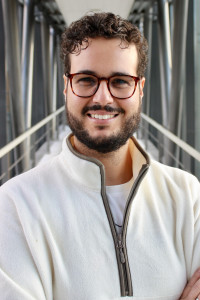Dr. Raphael Fagundes Rosa
Research:
Insulin is a hormone produced by beta-cells and regulates blood glucose levels. Type 1 diabetes (T1D) is a chronic autoimmune disease characterized by destruction of insulin-producing beta-cells in the pancreas. Patients with T1D need to diligently monitor their blood sugar levels throughout the day, adjusting insulin doses according to lifestyle factors such as meals and exercise. However, achieving optimal glycemic control remains elusive despite intensive insulin treatment. Elevated blood glucose levels lead to long-term complications like eye, kidney, heart, and vascular diseases, while life-saving insulin treatment presents the risk of hypoglycemia and unconsciousness. Consequently, T1D significantly impairs the overall quality of life for affected individuals. The objective of my research project is to develop effective and safe insulin-producing cells for islet replacement therapy in T1D. Ultimately, our goal is to pioneer the next generation of beta-cell replacement therapy using human pluripotent stem cells as an unrestricted source of insulin-producing cells.
Curriculum vitae:
I started my academic journey during my bachelor's in Pharmaceutical Sciences at the University of Brasilia, Brazil, where I conducted research projects focusing on the role of hypoxia-inducible factor-1α (HIF1α) signaling in the respiration of lower eukaryotic organisms. Graduating with honors in 2015, I pursued the Medical and Pharmaceutical Drug Innovation (MDPI) TopMaster program at the University of Groningen, in the Netherlands. There, I focused on studying the protective effects of bacterial metabolism on inflammatory responses in intestinal epithelial cells, as well as the impact of hypoxia and oxygen-sensing on inflammation in inflammatory bowel disease (IBD) patients and murine models. After earning a cum laude master's degree in 2017, I pursued a PhD at the University Medical Center Groningen (UMCG). During my PhD and a follow-up post-doc at the Dept. of Gastroenterology, I explored microenvironmental factors that influence intestinal epithelial homeostasis, such as oxygen sensing, bacterial metabolism, and co-morbidities.
In 2023, I joined the research group of Dr. Arnaud Zaldumbide focusing on developing safe and effective stem cell-derived beta-cells and their applications for T1D replacement therapy. This involves modulating the immunogenicity of stem cell-derived beta-cells and their applications for T1D replacement therapy, with the hope of improving the overall quality of life for individuals with T1D. Personally, I strive to bridge the gap between basic sciences knowledge and clinical application, incorporating insights from oxygen physiology to optimize therapeutic outcomes. My overarching career goal is to make meaningful contributions to society through academia by leveraging my expertise and passion for continual learning and teaching in a collaborative academic setting.




